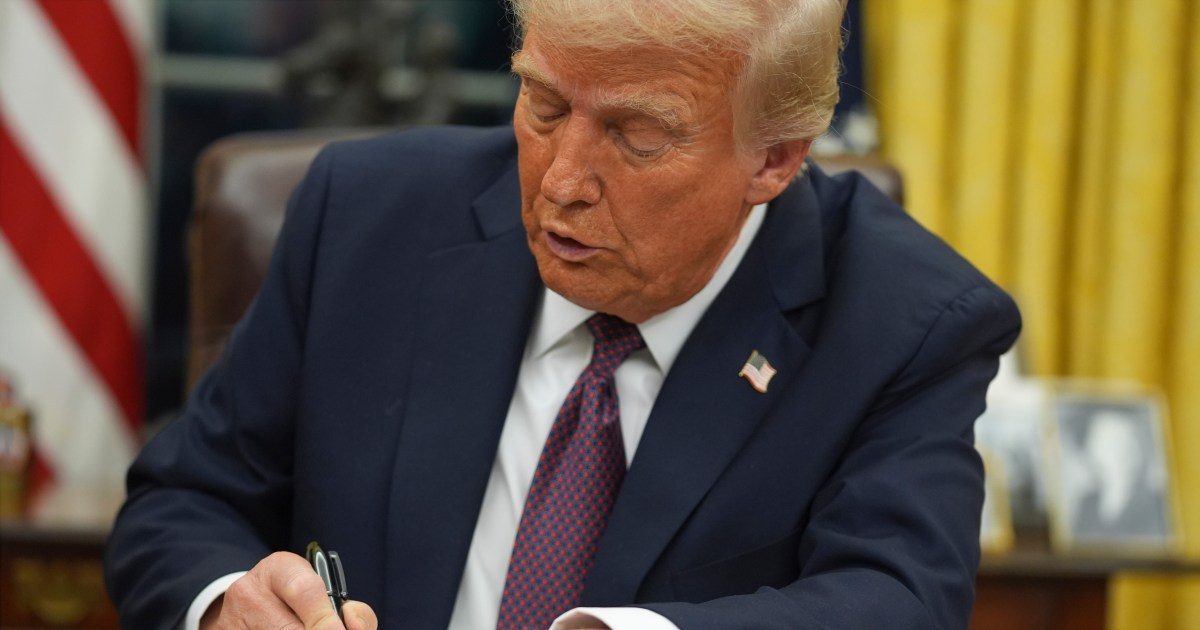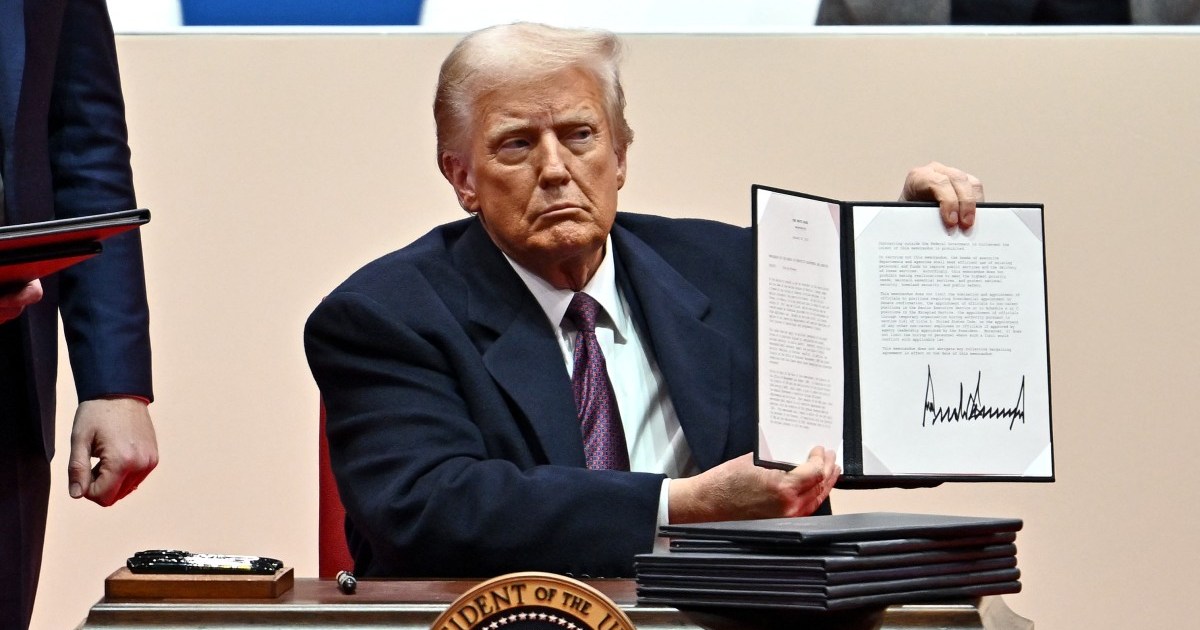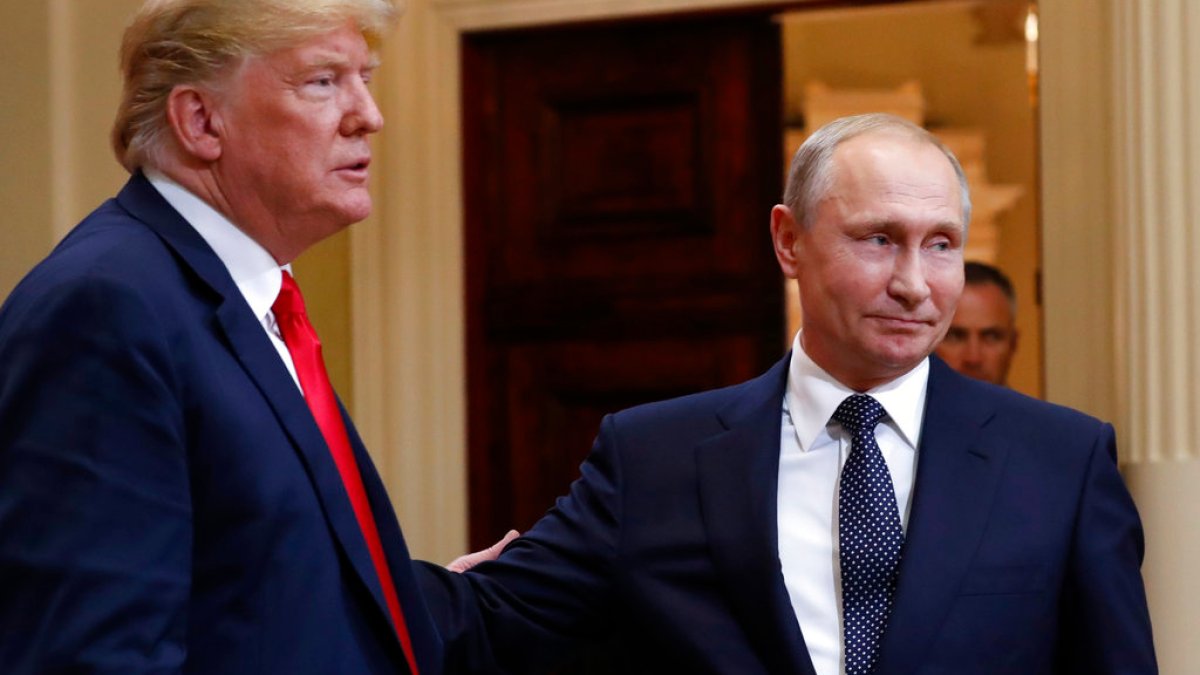First raft of lawsuits target US birthright citizenship, other Trump orders
 21 January 2025
21 January 2025


Washington, DC – The legal backlash to United States President Donald Trump’s second term has begun, with rights groups and state governments firing an early salvo against the Republican’s day-one decision to overhaul birthright citizenship.
Late on Monday, organisations including the American Civil Liberties Union (ACLU) and the Legal Defense Fund filed a lawsuit calling Trump’s actions unconstitutional, in a case that is likely to test the limits of his executive power.
list 1 of 3
What is an executive order, and what orders did Trump sign on day 1?
list 2 of 3
Can Trump really take over the Panama Canal, rename the Gulf of Mexico?
list 3 of 3
Full speech: Donald Trump’s second inauguration address
end of list
On Tuesday, 18 states also filed a similar lawsuit seeking to ground the order.
The filings represent just two of several legal challenges that Trump is set to face regarding the record 26 executive orders he signed on Monday, shortly after his inauguration.
On top of seeking to end birthright citizenship — the policy of conferring US citizenship to all people born in the US — Trump also signed orders to declare a national emergency at the southern border, roll back federal diversity programmes and end the federal recognition of transgender identity.
Advertisement
According to White House officials, those 26 executive orders were among the 42 presidential actions Trump took on his first day, including memoranda and proclamations.
In a statement, Cody Wofsy, the deputy director of the ACLU’s Immigrants’ Rights Project, argued that Trump’s decision to target birthright citizenship runs contrary to the protections guaranteed under the Fourteenth Amendment of the US Constitution.
“Birthright citizenship is guaranteed in our Constitution and is absolutely central to what America stands for,” Wofsy, the lead lawyer in the ACLU’s case, said.
“Denying citizenship to babies born on US soil is illegal, profoundly cruel, and contrary to our values as a country.”
Speaking at a news conference on Tuesday, California Attorney General Rob Bonta also decried Trump for starting his second term “by knocking down one of our country’s foundational, longstanding rights and disregarding our nation’s governing document”.
“I have one message for President Trump: I’ll see you in court,” Bonta said.
‘Cornerstone of our democracy’
Trump’s order would deny citizenship to babies born on US soil to undocumented parents or those on temporary work visas. It further instructs federal government agencies to not issue or accept documents “recognising United States citizenship” for children born to such parents.
At question is the interpretation of the Fourteenth Amendment, ratified in 1868. It states that “all persons born or naturalised in the United States, and subject to the jurisdiction thereof, are citizens of the United States”.
Advertisement
Trump’s executive order argues that those born to undocumented parents or those on temporary visas are not “subject to the jurisdiction” of the US and are therefore excluded from citizenship.
But the ACLU and other rights groups argue that this runs contrary to Supreme Court precedent. In 1898, the top court ruled that children born in the US to immigrant parents are, in fact, entitled to US citizenship.
The lawsuit was filed on behalf of three organisations “with members whose babies born on US soil will be denied citizenship under the order”.
“Birthright citizenship is a cornerstone of our democracy,” said Theo Oshiro, the co-executive director of Make the Road New York, one of the plaintiff organisations.
“Our members, who come from all over the world, have created vibrant communities, loving families, and built this country over generations. To deny their children the same basic rights as all other children born in the United States is an affront to basic values of fairness, equality, and inclusivity,” he added.
At a press conference on Tuesday, Bonta also cited concerns that Trump’s order would not only violate the US Constitution but also the 1952 Immigration and Nationality Act.
“I want to be clear that this isn’t some theoretical legal disagreement I have with the president,” Bonta said. “If allowed to stand, this order would endanger thousands of US citizens who will be born in the next year, real children and families just trying to live their lives in peace.”
Advertisement
People stripped of their US citizenship under this order, Bonta continued, would lose the ability to legally work in the US, obtain passports and access other government services.
“Children would be forced to live under the threat of deportation, the fear, anxiety and trauma of that alone is enormously detrimental to their mental and emotional well being,” Bonta said.
DOGE, federal worker actions
Lawsuits against executive actions can result in the orders being delayed, curtailed or ruled to be outside of the scope of presidential power. Many actions can only be enacted through congressional legislation.
In instances where executive orders wend their way through the lower courts and end up at the US Supreme Court, the resulting decisions can shape the constitutional interpretations of the executive branch’s reach.
Beyond the birthright citizenship lawsuit, Trump has also faced challenges to other executive orders he signed on his first day in office. He is expected to face a flurry of legal actions in the coming weeks.
Late Monday, for instance, the National Treasury Employees Union (NTEU) launched a legal challenge to Trump’s order making it easier to fire career employees in the federal government, the Bloomberg news agency reported.
In a statement to Bloomberg, NTEU National President Doreen Greenwald charged that Trump’s order “is about administering political loyalty tests to everyday employees in the federal workforce who took an oath to uphold the Constitution and serve their country”.
Advertisement
That would be in violation of civil service law, the NTEU said.
Another lawsuit filed by the law firm National Security Counselors charged that the Department of Government Efficiency (DOGE), officially created by a Trump executive order on Monday, violated pre-existing law.
Trump had set up DOGE to slash government bureaucracy and spending, as a non-governmental agency. He tapped billionaire Elon Musk to run it.
But the lawsuit claims that DOGE will operate as a government “federal advisory committee” and therefore must follow certain rules related to disclosures and hiring.
Related News

Israeli settlers commit arson and vandalism in spate of West Bank attacks

What is an executive order, and what orders did Trump sign on day 1?

Pakistan military court sentences 60 more civilians over pro-Khan protests

